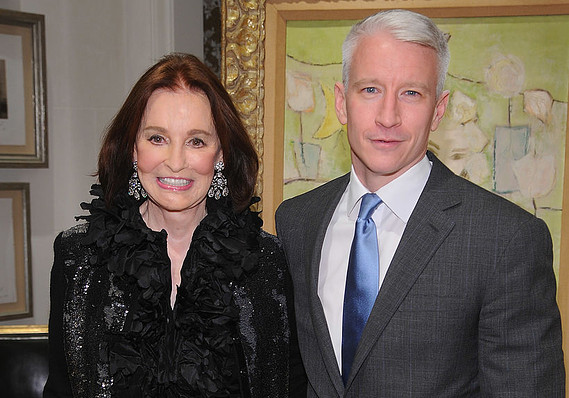 Getty Images
Getty Images
Many people are counting on being remembered by their parents in their will.
CNN T, +0.94% anchor Anderson Cooper is reportedly due to receive almost all of his late mother’s estate, according to documents filed Monday in Manhattan. The estate of the late socialite, heiress and businesswoman Gloria Vanderbilt, who died on June 17 at the age of 95, is worth approximately $200 million, according to some estimates. Cooper’s half-brother Chris Stokowski will receive their mother’s co-op at 30 Beekman Place in Manhattan.
‘I don’t believe in inheriting money. I think it’s an initiative sucker. I think it’s a curse.’
The inheritance may come as a surprise to Cooper. “I don’t believe in inheriting money,” Cooper told Howard Stern in 2014, according to the New York Post. “I think it’s an initiative sucker. I think it’s a curse. Who’s inherited a lot of money that has gone on to do things in their life? From the time I was growing up, if I felt like there was some pot of gold waiting for me, I don’t know if I would have been so motivated.”
Don’t miss: How to help your kids earn their inheritance, just like Gloria Vanderbilt did with Anderson Cooper
Other Americans, however, are not only expecting to receive a lucrative inheritance from their parents, they’re counting on it. By 2030, $15.4 trillion of global wealth will be transferred by individuals with a net worth of $5 million or more, according to a report released last week by Wealth-X, a global wealth consultancy. That figure is just slightly more than China’s entire economy or 16.4 times the market capitalization of online retailer Amazon AMZN, +0.20%
Also see: How low will the Dow go? Brace yourself for the worst-case scenario
The report, “A Generational Shift: Family Wealth Transfer Report 2019,” found that North America leads with the transfer of wealth: $8.8 trillion. “Europe possesses a slightly older wealthy population than the global average and will pass on a significant $3.2 trillion by 2030,” the report added. “Asia will account for just 12% of all wealth to be passed on, $1.9 trillion, largely due to its substantially younger wealthy population.”
By 2030, $15.4 trillion of global wealth will be transferred by individuals with a net worth of $5 million or more.
An estimated 18,500 individuals in the U.S. with a net worth of $100 million or more will be transferring a majority of that $8 trillion. “More so than their elders, the inheritors of this wealth maintain a more global outlook, seeking not only to preserve this wealth but also to find meaning in the way they use and manage it,” the report added. “Given that the majority of wealthy people around the world are over the age of 60, wealth transfer has become a greater priority.”
Rich or not, one in three Americans say their financial stability is dependent on receiving an inheritance, according to a 2018 survey by Merrill Edge, an online discount brokerage service provided by Bank of America Merrill Lynch BAC, +0.72% Some 36% of Generation X-ers and 32% of millennials and 20% of baby boomers say they’re relying on their family fortunes. For Generation Z, aged 18 to 22, this number jumps to 63%.
One in three Americans say their financial stability is dependent on receiving an inheritance.
“We’ve never seen such a strong reliance on receiving an inheritance,” said Aron Levine, head of Merrill Edge. The 1,000 respondents in the Merrill Edge survey said they were most likely to describe the stock market as “volatile” (34%), although it doesn’t appear to be deterring them from investing. Most Americans (57%) say they made money in the stock market in the past year with Generation X-ers (67%) and those older (68%), citing the most financial gains.
The gap between the rich and poor is widening. The U.K.-based House of Commons Library said the richest 1% will control nearly 66% of world’s money by 2030. Based on 6% annual growth in wealth, they would hold assets worth $305 trillion, up from $140 trillion today, the Guardian reported last year. The escalation in inequality between rich and poor is most “extreme” in Western Europe and the U.S., another report co-authored by the French economist Thomas Piketty found.









